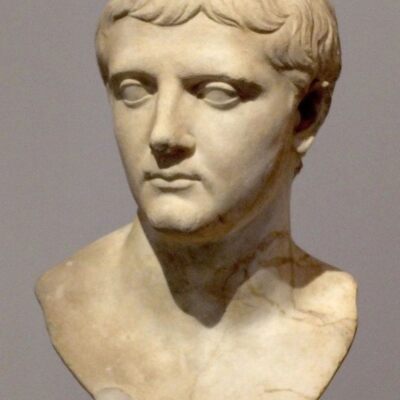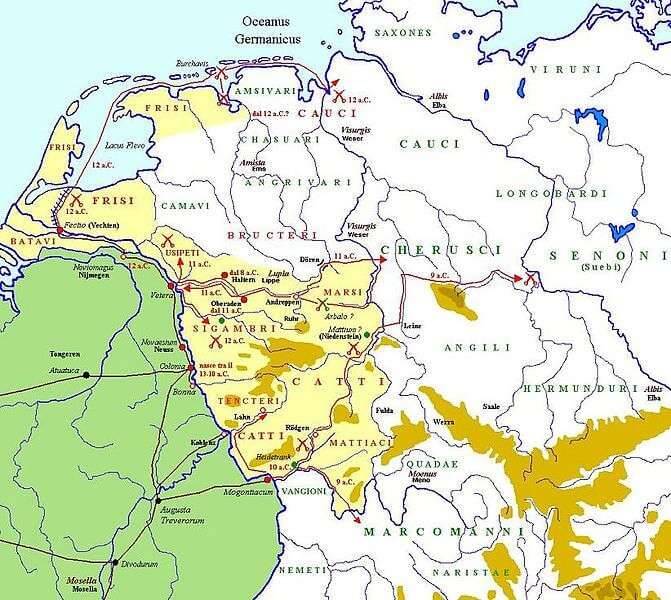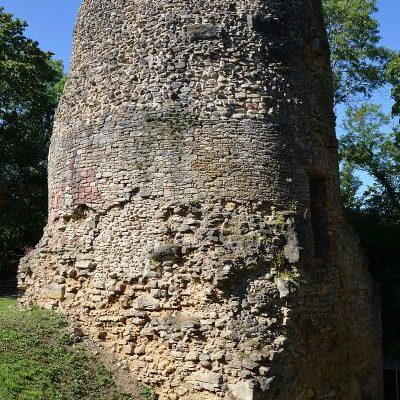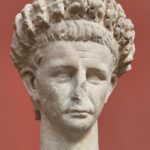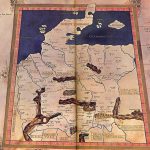Chapters
Drusus the Elder was born under the name Decimus Nero Claudius Drusus on January 14, 38 BCE. He was the son of Tiberius Claudius Nero and Livia. In addition, he was the father of Germanic, Livilla and Claudius. Husband of Antonia the Younger, daughter of the triumvir – Mark Antony and sisters Emperor Augustus – Octavia.
Drusus was Livia’s second son from her first marriage, though Suetonius suggests that since Livia was already pregnant when she married Octavian Augustus, it gave rise to some suspicions as to who Drusus’ father was. However, this opinion should be treated as a mere rumour, as it is generally known that August could not have children with Livia. Suetonius is based here on a Greek poem that prevailed at that time: “For the lucky ones, even children are born in three months”.
Drusus was one of the most outstanding people of his time. His friendly manners, endearing appearance and, most of all, brilliant military talents earned him the recognition and affection of legionaries. He was an outstanding commander, which he demonstrated by numerous victories over the Germans. His openly shown sympathy for republican principles won him recognition in wide circles. It was believed that he could contribute to the restoration of the republic.
In 15 BCE the brothers Tiberius and Drusus led a successful campaign against the Galician tribes of Reta and Windelik. The Réths inhabited the Alps between the Rhine and Inn rivers, and the Windeliks occupied areas north of them as far as the Danube itself. After strenuous fighting in the mountainous terrain, the Roman army achieved the final victory. The territories conquered by Drusus and Tiberius were organized into a separate province – Retia. The city of Augusta Vindelicorum (today Augsburg) became the provincial capital.
In 13 BCE Emperor Augustus, leaving Gaul, left there as his deputy and governor of the newly organized province of Three Gauls Drusus. Growing discontent in the province was calmed by Drusus by conducting a tax recalculation and calling a meeting of Gallic tribesmen at Lugdunum (today’s Lyon) to consider the complaints. In August 12 BCE there was a great ceremony there. In front of the altar dedicated to Rome and Augustus, representatives of all Gallic tribes gathered and a solemn sacrifice was made. The pacification of moods in Gaul was of great importance, giving the Romans an opportunity to concentrate on fighting the Germans.
Campaigns in Germany
In 12 BCE the Sugambras, who lived on the right bank of the Rhine, crossed the river. Drusus rejected them back and destroyed their own territories. Moving then down the Rhine, he subjugated the Friesians. To facilitate military operations, Drusus ordered a canal to be built that would connect the Rhine and the Zuyder See reservoir. The fleet sailed to the North Sea and sailed eastward along the coast. At the mouth of the River Ems, the Brukter fleet was wrecked in a naval battle, and at the mouth of the River Weser, the lands of the Chauk tribe were ravaged. The approaching winter ended the campaign. The returning fleet ran aground, but with the help of the Friesians, they managed to break free. Drusus returned to Rome in the glory of the first commander to reach the shores of the North Sea.
In 11 BCE Drusus led the army across the Rhine again. He defeated the tribes of the Usipets, Sugambrów, Khattas and reached the Weser, where he won the victory over the Cherusci. On the way back, he founded the first permanent Roman forts beyond the Rhine. In 10 BCE the Chatti and the Sugambras revolted again. After some minor successes, Drusus returned to Rome with Tiberius and Augustus. He was elected consul for the next year. By fall, however, he was back with the legions hibernating on the Rhine in preparation for the next year’s campaign.
In the spring of 9 BCE Drusus, this time as a consul, again led the troops deep into Germania. He attacked and defeated Khatts, Swabians, Marcomanni and Cherusci. He crossed the Weser and reached the Elbe. It was the farthest point in Germania that a Roman army had ever reached. In order to consolidate the gains, he took many measures: he built fortresses along the Elbe, Weser and the Meuse, he organized a permanent flotilla on the Rhine. Apparently, he was dissuaded from crossing the Elbe by a vision in which the supernatural-sized apparition of a woman foretold him his impending death.
Drusus was one of the best leaders Rome had ever had. This is how Suetonius describes his exploits:
He was the first of Roman generals to sail the northern Ocean, and beyond the Rhine with prodigious labour he constructed the huge canals which to this very day are called by his name. Even after he had defeated the enemy in many battles and driven them far into the wilds of the interior, he did not cease his pursuit until the apparition of a barbarian woman of greater than human size, speaking in the Latin tongue, forbade him to push his victory further. For these exploits he received the honour of an ovation with the triumphal regalia
– Suetonius, Claudius, 1
Drusus had similar views as his father and he did not hide it. He wanted to restore the old system of the Republic of Poland as soon as it came to power. An interesting message was left by Suetonius about the relations between Drusus and Princeps:
For in addition to victories over the enemy he greatly desired to win the “noble trophies”, often pursuing the leaders of the Germans all over the field at great personal risk; and he made no secret of his intention of restoring the old-time form of government, whenever he should have the power. It is because of this, I think, that some have made bold to write that he was an object of suspicion to Augustus; that the emperor recalled him from his province, and when he did not obey at once, took him off by poison. This I have mentioned, rather not to pass it by, than that I think it true or even probable; for as a matter of fact Augustus loved him so dearly while he lived that he always named him joint-heir along with his sons, as he once declared in the senate
– Suetonius, Claudius, 1
No source writes about Livia’s relationship to him, one can only guess that he might have reminded her ex-husband both in character and in future aspirations. Rather, Livia was more attached to Tiberius. It cannot be determined, however, whether this was due to Drusus dying too quickly, or to her lack of love for her younger son.
Death
Drusus died in the summer of 9 BCE. Suetonius writes that on his way back from the Elbe he fell off his horse and broke his leg so unfortunately, that gangrene broke into it. He died in a summer camp in Germania after 30 days in the presence of his brother, Tiberius, who, upon hearing of the accident, quickly went to the camp. He then escorted Mary with her brother’s body, which was brought to Rome.
Drusus ‘funeral was, according to Suetonius’ description, very elegant. Drusus even received a triumphal arch of marble, with the badges of victory, it was supposed to be located on the Appian road. Drusus’ ashes were laid to rest at the Mausoleum of Augustus. His descendants and he himself received the nickname “Germanicus”.
As Suetonius writes, he was a man hungry for fame, although he was approachable to citizens. The legionaries respected their leader so much that they erected a monument in his honour at Mogontiacum(now Mainz).
Memory
When he took office, Emperor Claudius – the son of Drusus – made several attempts to honour his father’s memory, incl. numerous games were organized in Circus Maximus on January 14 – Drusus’ birthday; coins commemorating the victories in Germany were minted; the Drusus monument near Ara Pacis was restored.
During the reign of Claudius, a road from Italy to Retia was established, which followed the route of the march of Drusus’s army during the expedition to Germania.

